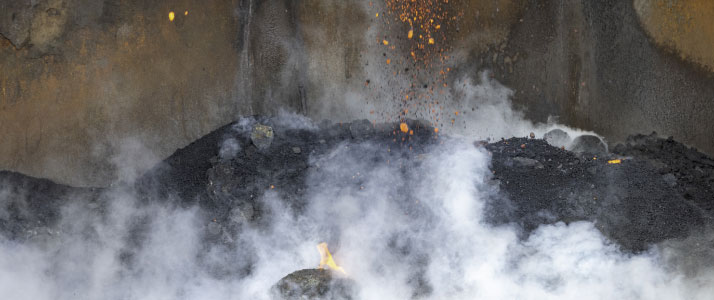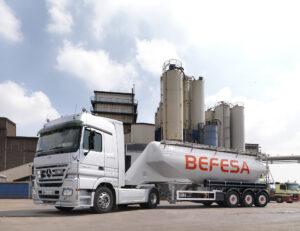Environmental
Befesa works at all times to protect the environment in which it carries out its activities.
Befesa identifies and controls the effects of its activities in order to minimise their impact on the environment. This is done by using technologies to prevent, mitigate or rectify any such impact.
The objective of Befesa is to minimise the impact of our operations on the environment and reduce our footprint, through the implementation of certified management systems such as ISO 14001, ISO 50001, ISO 14064, EMAS as well as the use of the Best Available Technologies (BAT) in our operations.
Climate Change
Befesa applies Best Available Technology (BAT) for energy efficiency and looks for efficiency opportunities as part of its operational excellence programme.
The programme identifies energy savings and emission reduction opportunities which are prioritised and implemented.
Befesa calculates its carbon footprint, which allows it to identify the opportunities for emission reductions and in turn to make both energy and economic savings.
All Befesa plants have been reporting GHG emissions for many years as part of standard operations reporting.
All Befesa plants have implemented and certified the measurement of GHG emissions in line with ISO 14064 for greenhouse gas emissions. The new steel dust recycling plants in China will also become certified to ISO 14064 by our target year of 2023.
The Board of Directors is responsible for approving the Climate Change Policy, receiving information on a regular basis about the carbon footprint evolution of the Company and agreeing on measures and steps to reduce GHG emissions.
At the same time, the Company’s senior management team, together with the CEO and the business VP, are responsible for managing the GHG emissions in the entire organisation.

Certified companies (ISO 14064)
Steel dust recycling services
Germany
Sweden
France
South Korea
Spain
Turkey
Aluminium salt slags recycling services
Germany
Spain
Strict air emissions levels are applicable and Befesa complies with all these levels. Befesa invests every year in further reducing the air emissions.

Energy
Befesa has implemented an energy efficiency system, based on the International Standard ISO 50001:2011 “Energy Management Systems” which will enable the company to follow a systematic approach in achieving continuous improvement of energy performance, including energy efficiency, energy use and consumption.
The application of this standard also contributes to more efficient use of available energy sources, to enhance competitiveness and to reducing greenhouse gas emissions and other related environmental impacts.

Certified companies (ISO 50001)
Steel dust recycling services
Germany
France
South Korea
Spain
Turkey
Aluminium salt slags recycling services
Germany
Spain
Waste
In 2020, Befesa managed and recycled 1.5 million tonnes of hazardous waste and residues and recovered 1.3 million tonnes of new materials which were reintroduced into the market.

Water
As water is a high-value resource and essential for the life of humans, animals and plants, Befesa monitors its water consumption as a KPI.
Reducing water use and the discharge of waste water (e.g. by recycling) can result in lower operating costs, reduce the risk of regulatory impacts and minimise potential production limitations due to the continuous and increasing scarcity of water in some geographic areas.
None of Befesa’s plants are located in areas of extremely high water stress.
Befesa’s plants have been designed with the capacity of recycling the effluent produced. The effluents are reintroduced into the process, significantly reducing water consumption and minimising the chances of any possible contamination through the effluent.

Transportation & logistics
Transportation and logistics play a key role in Befesa’s business as part of our offer of efficient, flexible and tailor-made solutions for customers.
Customers depend on just-in-time waste collection services since they do not have storage facilities for hazardous waste. This is a critical service that requires reliability, as customers would have to halt production if Befesa did not collect waste on time. This is one of the reasons Befesa’s service is essential for customers and why there is a long-term and deep customer relationship. Reliability and service assurance is the foundation for the trust our customers have, and this depends heavily on well-managed logistics operations
Befesa’s logistics operations cover national and international transportation services for industrial hazardous waste, especially dusts, sludges and slags. The integrated logistics infrastructure of the Company provides the reliable collection of hazardous waste from customers, a continuous supply of waste to Befesa’s recycling plants, and the delivery of the final recovered products (WOX, aluminium, etc.) to customers. Befesa’s recycling plants are strategically located close to its customers. Waste collection is typically local or regional in order to avoid the unnecessary movement of hazardous waste.
However, the market for Befesa’s final products, especially WOX, is global. Befesa transports its WOX directly to zinc smelters around the world. Although Befesa is responsible and manages the logistics, it uses third-party logistics companies to transport hazardous waste and end products.
Befesa is also responsible for notification services, providing our customers with all the necessary documentation that is mandatory for transfrontier movements of hazardous waste.

Certified companies (ISO 14001)
Steel Dust Recycling Services
Germany
Sweden
France
South Korea
Spain
Turkey
US
Aluminium Salt Slags Recycling Services
Spain